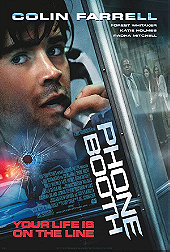A haunting slogan from the golden days of radio, spoken by the disembodied voice on ''The Shadow,'' was the boast: ''Who knows what evil lurks in the hearts of men? The Shadow knows,'' followed by an insinuating cackle. In ''Phone Booth,'' Joel Schumacher's flashy stunt of a movie, a contemporary descendant of that phantom voice unleashes a similarly nasty, all-knowing snicker every few minutes during the protracted phone conversation that consumes most of this clanking, overheated thriller.
The target of derision, Stu Shepard (Colin Farrell), is a scruffy young New York publicist who resembles an up-to-date version of Sidney Falco from ''Sweet Smell of Success.'' Stu's grubby little world is shaken one afternoon when he picks up the ringing telephone in the Midtown Manhattan phone booth he uses to make secret calls to his prospective girlfriend, Pamela McFadden (Katie Holmes), and finds himself the captive of a mysterious male caller who seems to know every detail of his life.
Pamela, an aspiring actress whom Stu has been stringing along with career advice and vague promises of introductions to showbiz biggies, is unaware that Stu is married. Nor does Stu's pretty blond wife, Kelly (Radha Mitchell), who works in a store on Columbus Avenue, realize that hubby has a wandering eye. Although gussied up with all sorts of cinematic tricks and a jittery, ticking soundtrack, ''Phone Booth,'' which Mr. Schumacher directed from a screenplay by Larry Cohen, is essentially a one-act radio play in which a sadistic voyeur with a high-powered rifle plays humiliating cat-and-mouse games with an urban everyman and taunts him into breaking down and confessing his sins.
Early on, the omniscient caller warns Stu that if he doesn't cooperate with every instruction, he will be shot dead from one of the thousands of windows looking out over the street. To prove he means business, the sniper summarily kills a loudmouthed pimp (John Enos III) who has been pestering Stu (with a baseball bat) to vacate the booth so his girls can use it to make dates.
Naturally Stu is assumed to be the killer. And when it turns out the sniper has thought ahead and stashed a gun in the roof of the booth to make him appear guilty, Stu (who came without a weapon) seems to be a goner no matter what happens. If the sniper, who again demonstrates his marksmanship by grazing one of Stu's ears, doesn't kill him, the police officers who arrive in force surely will.
''Phone Booth'' begins to lose its tenuous grip on reality once the law appears. Captain Ramey (Forest Whitaker), who leads a force of itchy-fingered sharpshooters, tries to negotiate with Stu, whom the caller coerces into inventing reasons he can't leave the booth. As the standoff drags on, what little suspense the movie had built up rapidly drains away.
Desperately stalling for time, the movie, which opens today nationwide (after being postponed from last fall because of the Washington-area sniper attacks), starts padding itself by taking tangents into the police captain's failed marriage. When a frantic Kelly appears on the scene, Stu (presumably to protect her) pretends she's a crazy woman who has been stalking him. By the time it dawns on the captain (for no particular reason other than that it's time to end the movie) that Stu may not be the killer, ''Phone Booth'' has used up its last quarter.
''Phone Booth'' is bogus on every level, right down to its half-hearted trick ending. The urban realism (foul-mouthed prostitutes and tough-talking cops) is as garishly clichéd as the media circus that builds around the killing. As a moral fable, ''Phone Booth'' is entirely meretricious. For one thing, Stu is awfully small potatoes compared with the big shots the sniper boasts of having executed in similar circumstances. Stu may have lust in his heart, but technically he still hasn't cheated. When he finally blubbers out his failures, there's nothing on the list that ought to get a metaphysical vigilante so riled up.
Mr. Farrell, who resembles a younger, bushier-eyebrowed Brad Pitt, acquits himself decently enough as the scuffling Bronx-born hustler who favors Italian suits. But this likable Irish actor, touted as Hollywood's studly flavor of the last several months, ultimately lacks the soulful magnetism that signifies a major screen presence.
So what is ''Phone Booth'' good for? If you want to soak in some more bad urban vibes to add to the ones already floating around, the movie could be your masochistic treat.
 Login
Login